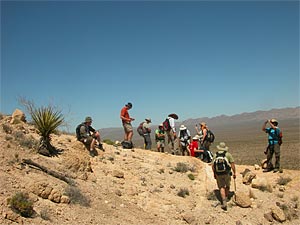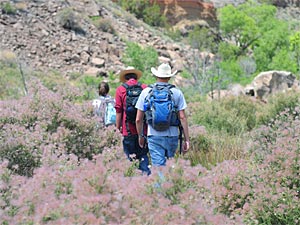Curriculum and Degree Requirements
Curriculum
Students in the Environmental Science program may pursue studies leading to M.S. and Ph.D. degrees. Their programs of study involve coursework representing four knowledge and skill areas:
-
 materials — the physicochemical nature of solid and fluid Earth materials;
materials — the physicochemical nature of solid and fluid Earth materials; - processes — physical, chemical and biological processes affecting the transport and fate of materials in environmental systems;
- systems — the dynamics of environmental systems wherein materials and processes are coupled over a wide range of spatial and temporal scales; and
- quantitative foundations — understanding and modeling uncertainty in environmental systems, notably as this pertains to science and engineering applications.
The Environmental Science curriculum also involves a novel capstone course, team taught by faculty from participating departments, aimed at exposing students to a topic of international significance requiring application and synthesis of multi-disciplinary knowledge and skills.
Degree tracks within the Environmental Science program include:
- M.S. with thesis: 24 credit hours of coursework and acceptance of a written thesis;
- M.S. without thesis: 30 credit hours of coursework (available only for students based in Environmental Engineering); and
- Ph.D.
- a minimum of 36 credit hours of coursework,
- passage of the comprehensive examination,
- passage of the Ph.D. qualifying examination,
- and acceptance and defense of a written dissertation;
- 72 total credit hours are required, including coursework, transfer credit (when appropriate) and dissertation research.
In addition:
Students have flexibility in choosing from a menu of courses in consultation with their Academic Advisory Committees, insuring balance among the four knowledge and skill areas listed above.
Directed Study research credit hours (up to 3 credit hours for M.S. degrees, 6 credit hours for Ph.D. degrees) may be included to meet the appropriate required total(s).
Students with a Masters degree from Vanderbilt are typically allowed to count Vanderbilt graduate credit hours toward the required total(s) subject to the approval of their Academic
Advisory Committees; students entering with a Masters degree from another institution must complete a minimum of 24 course credit hours at Vanderbilt.
For More Information Contact:
Guilherme Gualda
Director of Graduate Studies
Earth & Environmental Sciences
PMB 351805
2301 Vanderbilt Place
Nashville, TN 37235-1805
Phone: (615) 322-2976
g.gualda@vanderbilt.edu
Florence Sanchez
Director of Graduate Studies
Environmental Engineering
PMB 351831
2301 Vanderbilt Place
Nashville, TN 37235-1831
Phone: (615) 322-5135
florence.sanchez@vanderbilt.edu

